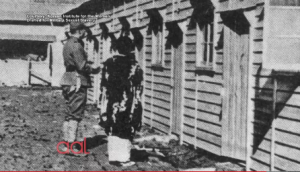Reporter
Asian American Life
Human trafficking and sexual slavery by the Japanese military may seem like a page straight out of the history books, but it’s a painful reality for 53 Korean women who say they are living proof that these war crimes did exist. These women, now in their 80’s and 90’s, are the last of the remaining Korean so-called comfort women, who claim they were forced to serve as sex slaves for the Japanese army.
Via Skype, two survivors talk about the horror and hopelessness they felt as young teenagers, when they were snatched from the side of the road and sent to unknown destinations far away from their homeland and their families.
“I kicked my feet and said I’m not going!” said 86-year-old Lee Ok-Sun, “…and someone came and swore at me in Korean and said “you wench, why don’t you go quietly?”
Historians estimate there were about 2000 comfort stations across Asia and up to 200,000 comfort women from China, Korea, Indonesia, Burma and others. In the early 1990’s, 230 Korean women registered with the South Korean government as former comfort women. Today, only 53 of those women remain.
Over the past two decades, the women have been unwavering in their demand that the Japanese government apologize for the role of its ancestors in this large scale sex trade. The Kono Statement issued by the Japanese government in 1993 apologized to the comfort women, but Abe has wavered in his support for that statement and the statement remains controversial with the South Korean government and the comfort women. They continue to press for an apology.
On April 29th, 2015, Japanese Prime Minister Shinzo Abe addressed the U.S. Congress, and while he expressed his condolences for American lives lost in World War Two, Abe made no mention of the comfort women issue, despite widespread hope leading up to the speech that Abe would finally apologize.
The fight to restore the dignity of the women continues on at CUNY’s Queensborough College. A twelve-week internship program run by Dr. Jimin Kim teaches a group of students about the history of the region and these alleged war crimes. The highlight of the class is Skype interviews with survivors, which the students then use to create artwork or websites. These projects are temporarily displayed at the Kupferberg Holocaust Center on the CUNY campus and there are plans to make this a permanent exhibit.
Watch the story on this month’s Asian American Life
Other features this month:
- Alan Muraoka from Sesame Street, one of the top Asian American children’s entertainers on television, talks with host Ernabel Demillo about his career as an actor, producer and theatre director, and looks back on his childhood as an avid fan of the famed public television series.
- Andrea Jung, former CEO of Avon, is listed by Forbes Magazine as one of the most powerful women in the world. Reporter Kyung Yoon and Jung discuss her new role – fighting poverty as President and CEO of Grameen America, a microfinance organization that champions women’s causes in the United States.
- Forensic scientist Dr. Henry Lee has solved complex and well-publicized cases like those of the John F. Kennedy assassination, and the O.J. Simpson and JonBenét Ramsey murder cases. Lee tells Paul Lin how he trains future forensic scientists at The Henry C. Lee Institute of Forensic Science in West Haven, Connecticut.

